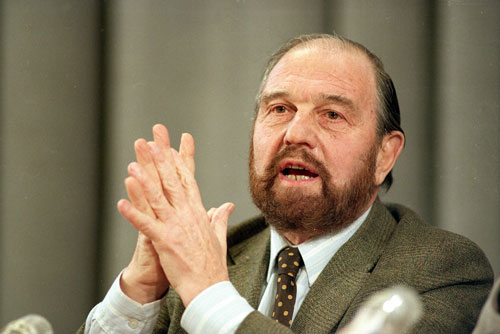Moscow
George Blake, who died in Russia on Saturday at the age of 98, was the last in a line of British spies whose secret work for the Soviet Union humiliated the intelligence establishment when it was discovered at the height of the Cold War.
Britain says he exposed the identities of hundreds of Western agents across Eastern Europe in the 1950s, some of whom were executed as a result of his treason.
His case was among the most notorious of the Cold War, alongside those of a separate ring of British double agents known as the Cambridge Five.
Unmasked as a Soviet spy in 1961, Blake was sentenced to 42 years in London’s Wormwood Scrubs prison. In a classic cloak-and-dagger story, he escaped in 1966 with the help of other inmates and two peace activists, and was smuggled out of Britain in a camper van. He made it through Western Europe undiscovered and crossed the Iron Curtain into East Berlin.
He spent the rest of his life in the Soviet Union and then Russia, where he was feted as a hero.
Reflecting on his life in an interview with Reuters in Moscow in 1991, Blake said he had believed the world was on the eve of Communism.
“It was an ideal which, if it could have been achieved, would have been well worth it,” he said.
“I thought it could be, and I did what I could to help it, to build such a society. It has not proved possible. But I think it is a noble idea and I think humanity will return to it.”
In a condolence message published by the Kremlin, Russian President Vladimir Putin said Blake was a professional of particular vitality and courage who made an invaluable contribution to global strategic parity and peace.
“The memory of this legendary person will be preserved forever in our hearts,” he wrote.
Blake was born in Rotterdam in the Netherlands on Nov. 11, 1922, to a Dutch mother and an Egyptian Jewish father who was a naturalised Briton.
He escaped from the Netherlands in World War Two after joining the Dutch resistance as a courier and reached Britain in January 1943. After joining the British navy, he started working for the British Secret Intelligence Service, MI6, in 1944.
After the war, Blake served briefly in the German city of Hamburg and studied Russian at Cambridge University before being sent in 1948 to Seoul where he gathered intelligence on Communist North Korea, Communist China and the Soviet Far East.
He was captured and imprisoned when North Korean troops took Seoul after the Korean War began in 1950. It was during his time in a North Korean prison that he became a committed Communist, reading the works of Karl Marx and feeling outrage at heavy US bombing of North Korea.
After his release in 1953, he returned to Britain and in 1955 was sent by MI6 to Berlin, where he collected information on Soviet spies but also passed secrets to Moscow about British and US operations.—AP










